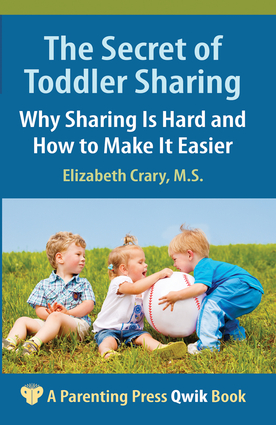Suggested reading from Chicago Review Press
 Mother's Day Mother's Day |
 Father's Day Father's Day |

 |
Why Sharing Is Hard and How to Make It Easier
By Elizabeth Crary
Parent/Educator
A Parenting Press Qwik Book
FAMILY & RELATIONSHIPS
32 Pages, 5.5 x 8.5
Formats: Trade Paper, PDF, Mobipocket, EPUB
EPUB, $7.99 (US $7.99) (EU $6.99) (CA $8.99) (AU $8.99)
ISBN 9781936903122
Rights: US & CA
Chicago Review Press (Sep 2013)
Parenting Press
Overview
Offering parents realistic expectations about toddler behavior, this guide provides detailed, how-to advice for teaching kids to share and for intervening when toddlers have difficulty sharing. It reviews children’s temperament and development and the roles they play in the willingness to share, while also explaining how to handle the child who never complains about giving up a possession. Relating personal experiences as real-life examples of the teaching process, this parenting reference includes scenarios and suggests dialogs to use. Three factors that encourage children to share are introduced, along with five strategies that specify how to teach sharing. Whether sharing issues come up with toddlers on play dates or in public places, parents will be armed with the knowledge of how to handle and teach their child.
Author Biography
Elizabeth Crary, MS, is the award-winning author of more than 40 children’s and child-guidance publications. She has taught parenting education, with an emphasis on problem-solving and skill-building methods, and established Parenting Press in 1979. She lives in Seattle.
May we also suggest...
Trade Paper
Published Jan 2011
Trade Paper
Published Jan 2011
Trade Paper
Published Sep 2013
Offering parents realistic expectations about toddler behavior, this guide provides detailed, how-to advice for teaching kids to share and for intervening when toddlers have difficulty sharing. It reviews children’s temperament and development and the roles they play in the willingness to share, while also explaining how to handle the child who never complains about giving up a possession. Relating personal experiences as real-life examples of the teaching process, this parenting reference includes scenarios and suggests dialogs to use. Three factors that encourage children to share are introduced, along with five strategies that specify how to teach sharing. Whether sharing issues come up with toddlers on play dates or in public places, parents will be armed with the knowledge of how to handle and teach their child.
Trade Paper
Published May 2014
Published May 2014
Mobipocket
Published May 2014
EPUB
Published May 2014
Published Sep 2013
Offering parents realistic expectations about toddler behavior, this guide provides detailed, how-to advice for teaching kids to share and for intervening when toddlers have difficulty sharing. It reviews children’s temperament and development and the roles they play in the willingness to share, while also explaining how to handle the child who never complains about giving up a possession. Relating personal experiences as real-life examples of the teaching process, this parenting reference includes scenarios and suggests dialogs to use. Three factors that encourage children to share are introduced, along with five strategies that specify how to teach sharing. Whether sharing issues come up with toddlers on play dates or in public places, parents will be armed with the knowledge of how to handle and teach their child.
Mobipocket
Published Sep 2013
Offering parents realistic expectations about toddler behavior, this guide provides detailed, how-to advice for teaching kids to share and for intervening when toddlers have difficulty sharing. It reviews children’s temperament and development and the roles they play in the willingness to share, while also explaining how to handle the child who never complains about giving up a possession. Relating personal experiences as real-life examples of the teaching process, this parenting reference includes scenarios and suggests dialogs to use. Three factors that encourage children to share are introduced, along with five strategies that specify how to teach sharing. Whether sharing issues come up with toddlers on play dates or in public places, parents will be armed with the knowledge of how to handle and teach their child.